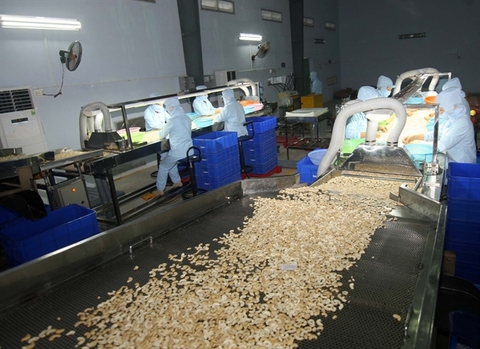
Domestic cashew processing enterprises have faced difficulty in import raw cashew because of new regulation. — Photo vinacas
Domestic cashew processing enterprises have been facing difficulties due to a new regulation that requires additional checks on raw materials imported from African ports.
Dang Hoang Giang, vice president and general secretary of the Viet Nam Cashew Association (Vinacas), said: "The domestic industry is facing difficulties this year, and new regulations has pushed up production costs."
They needed more time and money to obtain customs clearance, according to the association.
The enterprises also had to send more staff to track their shipments, causing congestion at ports and reducing the competitiveness of enterprises and the industry, it said.
In mid-March, Vinacas chairman Pham Van Cong sent a letter to the department to propose solutions for the new regulations that aimed to prevent the Trogoderma SP worm from entering the country.
Hoang Trung, head of the Ministry of Agriculture and Rural Development’s Department of Plant Protection, said the department had directed the Plant Quarantine Sub-department of Region 2 that in April if no batches were infected, the sub-department would permit businesses to move shipments directly to their warehouses.
If any batches were found to be infected, the quarantine sub-department would propose stopping shipments from the relevant countries, Trung said.
Since the beginning of the year, the department had checked all shipments arriving at the country’s ports. The process took 7-10 days compared to 2-3 days in the past.
Vinacas has asked the Plant Protection Department to resume quick inspections at the dock and further checks where necessary at warehouses.
This was the peak time for buying and importing raw cashew for processing, so if the new regulation was not adjusted, it would seriously hit domestic cashew industry, Giang said.
Trung said since 2013, the department has found numerous shipments from Africa containing the Trogoderma SP worm. The worm is classed as dangerous and is on a list of tightly-controlled pests in many countries.
Previously, the quarantine process for imported goods needed four hours at border gates and 10 hours at seaports and airports.
“We have continued to find the worms in imported cashew shipments so enterprises must work with quarantine agencies to stop this pest from entering the country. Vietnamese goods would face many difficulties and eradicating the worms would cost a lot.”
“If quarantine agencies do not find worms in the next 5-7 batches, we will permit businesses to ship them to warehouses and then check the remaining batches, creating favourable conditions,” Trung said.
According to the ministry, imports of raw cashew nuts in the first quarter of this year reached 224,000 tonnes worth US$389 million. The imports surged by 6.2 per cent year on year in volume but reduced 19.5 per cent in value.
In the first quarter, Cambodia was the largest supplier of cashews for Viet Nam, accounting for 33.2 per cent of total import value, up about 10 times year-on-year. The second largest import value was from the Ivory Coast with $47 million, up about 2 times. The third was from Indonesia with $24.2 million, up 1.8 times.
Viet Nam’s raw cashew imports this year are forecast to reach more than 1 million tonnes. The nation has imported raw materials for many years because of its reduction in cashew growing area and output. — VNS